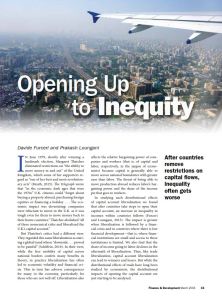
Read or listen offline
Recommendation
Policy makers have struggled with the issue of capital account convertibility for generations. In the past, the International Monetary Fund treated the economic growth benefits of free capital flows as an act of faith. But by 2012, the IMF’s understanding of the subject had become far more nuanced. It continues to advocate convertibility, yet it acknowledges that governments need to consider the downsides. In this informative research report, IMF economists Davide Furceri and Prakash Loungani explain why convertibility can worsen financial volatility and income distribution, and they offer cautionary counsel on how governments can lessen the adverse effects of capital mobility. getAbstract recommends this concise but well-argued article to policy makers, central bankers and investors.
Take-Aways
About the Authors
Davide Furceri is an economist at the International Monetary Fund, where Prakash Loungani is a division chief.




















Comment on this summary or Start Discussion